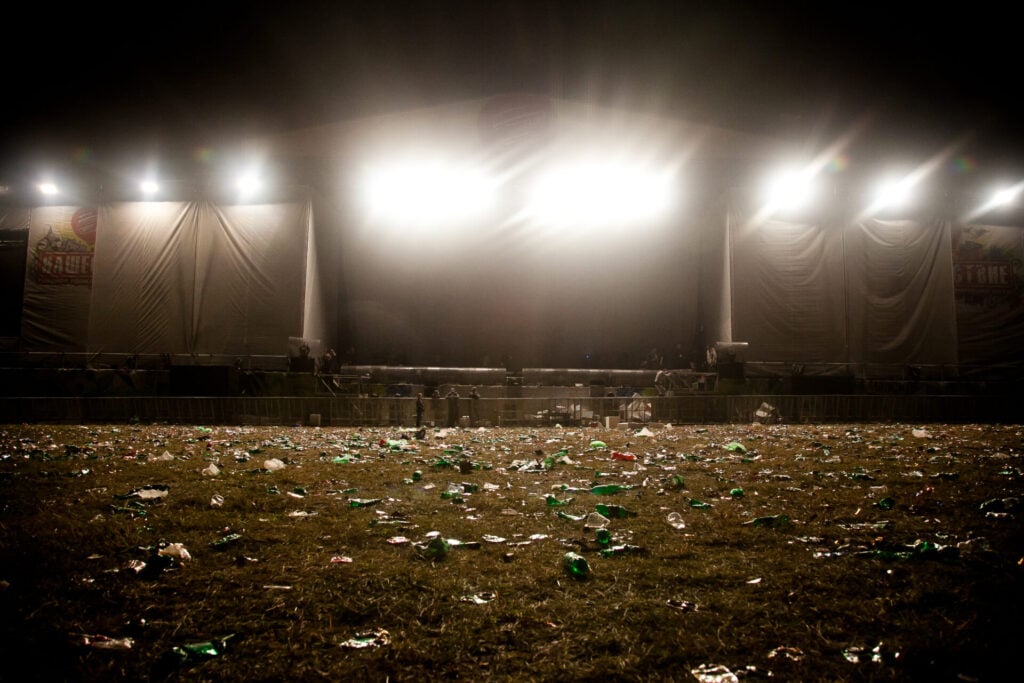It’s that time of year again: tents are being dusted off, glitter is being ordered in bulk, and festival wristbands are popping up across Instagram feeds.
As festival season kicks off, millions of music lovers are preparing to descend on fields, beaches, forests, and city parks around the world. From the legendary Glastonbury in the UK to Spain’s Primavera Sound, Germany’s Melt!, and America’s Burning Man, these massive gatherings are often celebrated for their creativity, community spirit, and once-in-a-lifetime performances. But behind the music and magic lies an inconvenient truth: festivals can come with a serious environmental price tag.
From long-haul flights and petrol-guzzling road trips to mountains of single-use plastics, discarded tents, and overflowing landfill bins, the environmental toll of music festivals is enormous.
A 2025 vision report by Julie’s Bicycle suggests UK festivals are collectively producing over 20,000 tonnes of waste annually, with less than a third typically recycled.

At Glastonbury, around 2,000 tonnes of waste is generated over just five days. Add in emissions from generators, food trucks, merchandise, and the sheer volume of travel, and the carbon footprint becomes staggering.
Discarded tents, often treated like fast fashion for festivals, have become a major environmental issue in their own right. After the final encore, thousands of tents are routinely left behind, many barely used, some still in their packaging.
While it’s easy to assume they’re collected and donated, the reality is far more wasteful. Most cheap festival tents are made from mixed materials like polyester and fiberglass that are difficult or impossible to recycle. As a result, the majority end up in landfill, contributing to the growing plastic crisis.
Even that sparkly festival glitter comes at a cost. Most of it’s made from microplastics that can wash into rivers and oceans, where they stick around far longer than your Instagram story. Opt for Bioglitter, made from plant cellulose (mainly eucalyptus), that breaks down naturally.

Thankfully, some artists and organisers are starting to clean up the act.
The legendary band Massive Attack has partnered with the Tyndall Centre for Climate Change Research to map the carbon footprint of touring, with the goal of radically reducing it. They even released their touring data to help other musicians make more sustainable choices.
Coldplay has taken this even further. After putting their touring on hold due to environmental concerns, they returned with a pledge to make their Music of the Spheres world tour as sustainable as possible using kinetic dance floors, solar-powered stages, and planting a tree for every ticket sold.
Some festivals themselves are also stepping up. Shambala Festival in the UK is now meat-free, has eliminated single-use plastics, and runs entirely on renewable energy. Boom Festival in Portugal uses composting toilets, treats its own greywater, and even powers parts of the site with solar energy.

So, how can you take matters into your own hands and be a more eco-conscious festival-goer this summer?
Travel Smart
First, think about how you travel. Getting to and from the festival site is often the biggest contributor to its overall carbon footprint, especially when thousands of attendees drive solo or catch short-haul flights. Instead of hopping on a plane, consider taking the train or a long-distance bus, both are significantly lower-impact and often more relaxed ways to travel. Many festivals now offer shuttle services directly from major cities or train stations, making the switch even easier. If you’re driving, carpooling with friends (or strangers turned friends) doesn’t just reduce emissions, it’s also cheaper and a great way to kick off the weekend before the first act even takes the stage.
These tents, often made from hard-to-recycle polyester or polyethylene, can take decades to break down and carry the same plastic footprint as nearly 9,000 straws.
Pack Reusables
One of the biggest contributors to festival waste? Beer cups. Incredibly, an estimated 100 million single-use plastic cups are used at UK festivals and live events each year, with the majority ending up in landfill or incinerators. To tackle this, many festivals have introduced reusable cup schemes, offering everything from recycled stainless steel pint cups to sturdy plastic alternatives with small deposits attached.

Glastonbury and Shambala are among those leading the charge, with some banning disposable bar cups entirely. It’s a solid reminder to bring your own reusables because those small choices add up when 200,000 people are doing the same.
Choose a Better Tent
When it comes to shelter, avoid buying cheap, flimsy tents only to abandon them. According to the Association of Independent Festivals, around 250,000 tents are left behind at UK festivals every year, most of which end up in landfill. These tents, often made from hard-to-recycle polyester or polyethylene, can take decades to break down and carry the same plastic footprint as nearly 9,000 straws. It might feel harmless to walk away from your campsite, but the environmental cost lingers long after the music stops. Instead, invest in a durable tent you’ll reuse, or look into pre-pitched rentals offered by the festival.
Dress Consciously
Festival fashion is another opportunity to tread lighter. Instead of buying new fast-fashion outfits that’ll be worn once, check out vintage stores, swap with friends, or support ethical brands. And please, skip the plastic feather boas and sequin-covered ensembles that shed microplastics with every dance move.
Eat Greener

Food choices matter too. Choosing plant-based meals and supporting vendors using local, organic ingredients is one of the easiest ways to lower your impact. Meat-heavy diets have a significant carbon footprint, and festivals are the perfect chance to try something new and delicious.
Leave No Trace
Lastly, respect the space. Stick to marked paths, dispose of waste properly, and use composting toilets when available. Festivals are temporary communities, but the damage they leave behind can be long-lasting.
Festivals will always be about joy, expression, and escape but that doesn’t mean they need to come at the planet’s expense. With a bit of planning and the right attitude, it’s possible to dance all weekend and still tread lightly.









